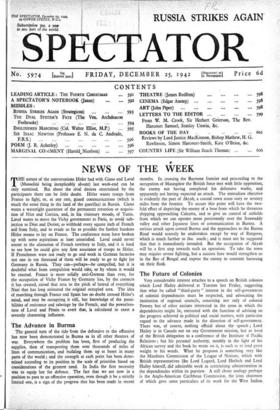The Advance in Burma
The general turn of the tide from the defensive to the offensive has now been demonstrated in Burma as in all other theatres of war. Everywhere the problem has been, first of producing the supplies, then of transporting them over thousands of miles of lines of communication, and building them up at bases in many parts of the world ; and the strength at each point has been deter- mined according to its position in the scale of priorities based on considerations of the greatest need. In India the first necessity was to equip her for defence. The fact that we are now in a position to pass to an offensive operation, even though it be a strictly limited one, is a sign of the progress that has been made in recent
months. In crossing the Burmese frontier and proceeding to the occupation of Maungdaw the British force met with little opposition, the enemy not having completed his defensive works, and apparently not having expected an attack. The immediate objective is evidently the port of Akyab, a coastal town some sixty or seventy miles from the frontier. To secure this point will have the two- fold effect of depriving the enemy of a base from which he threatens shipping approaching Calcutta, and to give us control of airfields from which we can operate more persistently over the Irrawaddy valley and other Japanese lines of communication in Burma. A serious attack upon central Burma and the approaches to the Burma Road would scarcely be undertaken except by way of Rangoon, which is much further to the; south ; and it must not be supposed that that is immediately intended. But the occupation of Akyab will be a first step towards such an operation. To take the town may require severe fighting, but a success here would strengthen us in the Bay of Bengal and expose the enemy to constant harassing on their flank.


























